Stay in the know on all smart updates of your favorite topics.
Swedish Chamber of Commerce Webinar TechTalent - Explore how to attract, retain and manage tech talents Tuesday 20 April 2021 10.00 -11.00
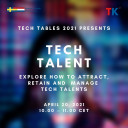
Tech Talent
Explore how to attract, retain and manage tech talents
With the acceleration in digital, the demands on technology — for
speed, flexibility, reliability, security, and value — have radically
increased. For company leaders reviewing how to transform their
organizations, one tricky question is emerging: Where do I find the
people to do all the work? Companies have to hire the best, but that
won’t be enough. They’ll also need to rethink how they reskill and
upskill their people. People are the most important factor for a
company’s growth, especially in its early stages of development. How to
find the right people and how to get a better understanding on how to
create great teams?
SPEAKERS LINE UP:
Dr. Cara Antoine, Managing Director Digital Transformation at IG&H
Bernie van Leeuwen, Managing Director SKF Netherlands
Rik Zuidmeer, Partner and member of the International Leadership Team of Mercuri Urval
Jeffrey Kenens, Partner TK
Moderator: Rens Goudsmit, Head of TK Tech & Attorney at law
For more information and to sign up for this webinar please follow the link.
Gezocht: (junior) Communicatie- en Programmamedewerker
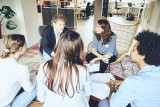
Wil jij je inzetten voor betere straten, buurten en steden? Ben jij thuis in de wereld van communicatie, social media en community management? En heb je affiniteit met stedelijke innovatie?
Kom dan het Amsterdam Smart City team versterken! Voor ons kernteam (bestaande uit 6 mensen) zijn wij op zoek naar een:
(junior) Communicatie- en programmamedewerker
Amsterdam Smart City is een onafhankelijk innovatieplatform dat innovatieve bedrijven, kennisinstellingen, overheden en proactieve bewoners samenbrengt en vorm geeft aan de stad van de toekomst.
Wij zijn ervan overtuigd dat de veranderingen die nodig zijn voor de vooruitgang van de stad en regio alleen gerealiseerd kunnen worden door samen te werken. Al onze activiteiten zijn daarom gericht op het faciliteren van ontmoeting, interactie en samenwerking, zodat partijen samen tastbare, duurzame innovaties tot stand kunnen brengen. Amsterdam Smart City richt zich met name op deze vier thema’s: mobiliteit, de digitale stad, energie en circulaire economie. Met het Amsterdam Smart City team zorgen we voor verbinding.
Wat ga je doen?
Je voert de communicatie- en communitystrategie actief uit door het maken van content, het schrijven van nieuwsbrieven, beheren van onze social media kanalen en het organiseren van events. Je bent veel in contact met de partners en andere organisaties binnen het netwerk van ASC.
Daarnaast werk je met onze partners aan het aanjagen van innovaties binnen het transitiepad Mobiliteit & Logistiek en legt verbindingen met de community. Ook breid je het netwerk uit met relevante organisaties en innovatieve projecten. De communicatie- en programmamedewerker werkt nauw samen met het gehele smart city team en legt verantwoording af aan de communicatiemanager. Daarnaast heb je een aantal programma ondersteunende taken.
Taken
• Je beheert onze social media kanalen, geeft inzage in de statistieken en onderneemt actie op basis van de data.
• Je onderhoudt het dagelijks contact met de leden van onze community op www.amsterdamsmartcity.com
• Je verzamelt, schrijft, redigeert en publiceert content voor de community en andere stakeholders.
• Je organiseert en draagt bij aan evenementen voor partners en ons bredere netwerk in de regio en communiceert hierover.
• Je coördineert, onder begeleiding, je eigen transitiepad: Mobiliteit & Logistiek en monitort voortgang van projecten en legt verbindingen.
• Je verbindt, mobiliseert en activeert partners en communityleden
• Je voert ondersteunende programma taken uit, zoals het vormgeven van presentaties en zorgdragen voor documentatie en het bijhouden van het CRM systeem.
Profiel:
• WO/HBO werk- en denkniveau
• Opleiding op gebied van communicatie of vergelijkbaar
• 1-2 jaar werkervaring
• Goede beheersing van Nederlands en Engels in woord en schrift
• Ervaring op het gebied van online communicatie, community management en/of projectondersteuning
• Affiniteit met innovatie en stedelijke ontwikkelingen, met het thema Mobiliteit & Logistiek in het bijzonder
• Type aanpakker, zelfstandig, communicatief sterk en flexibel.
• Gedreven in het creëren van maatschappelijke waarde
Wat bieden wij?
Wij bieden je een fijne werkplek op het Marineterrein in Amsterdam, met een informele en collegiale sfeer. Op dit moment werken we uiteraard veel thuis. We zijn een klein team (6 personen) waarin we nauw met elkaar samenwerken. We werken intensief samen met een grote groep gedreven mensen die zich inzetten voor een duurzame stad en regio, voor iedereen. Het is een regionale, nationale én internationale werkomgeving waarin je eigen inbreng en pro-activiteit zeer gewaardeerd worden.
We zoeken iemand voor 32-40 uur per week. Salarisindicatie o.b.v. 40 uur: €2.900 - €3.400 bruto excl vakantiegeld en eindejaarsuitkering. Wij bieden een jaarcontract met uitzicht op een vaste aanstelling.
Interesse gewekt?
Vind je dit goed klinken? Dan horen we graag van je! Stuur je CV en een korte motivatie voor 17 april naar: info@amsterdamsmartcity.com. De eerste gesprekken zijn op 20 en 21 april. Voor meer informatie over de functie kun bellen met Menouschka Plugge via 06-43752636.
Hopelijk spreken we elkaar snel!
Circular Innovation City Challenge

Amsterdam is one of the world cities that support the Circular Innovation City Challenge and is proud to serve on the jury. Cities are looking for early prototype to market-ready innovative solutions, with the potential to help create circular and thriving cities.
If your company has a digital or data-driven solutionthat enhances the circular economy, apply now.
Online Event 24/3
You can also join online on March 24th, 14.00-15.00 CET to participate in the @Circular City Week New York event, in which The Circular Innovation City Challenge will be presented. Sign up and read more about the session: https://bit.ly/38TOwZ4
#circularcities #cicc #climateneutral #cities #tech #digital #circulareconomy #data #wcef
Challenge partners: Glasgow City Council I Gemeente Amsterdam I New York City Economic Development Corporation | City of New York I City of Toronto I Ellen MacArthur Foundation I Leaderlab I Danish Design Centre / Dansk Design Center
MicroDonor: een verdienmodel volgens publieke waarden
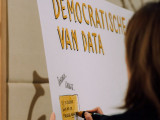
Waag onderzoekt verantwoorde technologie binnen de verschillende lagen van de Public Stack. In dit programma richten we ons op Web Monetization, een standaard die momenteel in ontwikkeling is en open, vrijwillige microbetalingen op het web mogelijk maakt. Op donderdag 18 maart tussen 19:30 en 21:00 uur gaan we hierover in gesprek.
Er gaat vrijwel geen dag voorbij dat we geen gebruik maken van de technologie van big tech-bedrijven. We zijn sterk afhankelijk geworden van de door hen ontwikkelde technologie. Een groot deel van de ‘gratis’ webplatforms baseert hun verdienmodel op het verzamelen en doorverkopen van persoonsgegevens. De gebruiker wordt gezien als een commercieel te exploiteren bron: profielgegevens zijn geld waard. Waag staat echter voor publieke waarden aan de basis van technologie: aan de hand van het Public Stack-model strijden we voor open, eerlijke en inclusieve technologie om dergelijke exploitatie tegen te gaan.
De afgelopen jaren is er een opmars in organisaties die wél volgens de Public Stack-waarden opereren. Deze open-source platforms, contentmakers en culturele instellingen bieden hun materiaal of diensten op een transparante en eerlijke manier aan hun gebruikers. Deze organisaties moeten echter een financieringsmodel kunnen gebruiken dat ook op de lange termijn duurzaam is. Een model als web monetization biedt perspectief: via het Amerikaanse Grant for the Web heeft Waag binnen het project MicroDonor de kans om dit verder te onderzoeken.
MicroDonor draait om vrijwillige (micro)donaties van gebruikers aan platforms en contentmakers die zij willen steunen. Gebruikers maken automatisch een klein bedrag (denk aan een halve eurocent) over aan een organisatie tijdens het bezoeken van diens platform. Dit gebeurt via Interledger, een protocol waarmee transacties tussen verschillende blockchains kunnen worden gefaciliteerd.
Een dergelijk systeem werpt echter ook vraagstukken op: welke voordelen biedt een microdonatie-model boven alternatieven, en wat voor alternatieven zíjn er überhaupt? Is een systeem van digitale microdonaties in lijn met de waarden en insteek zoals verwoord in de Public Stack? Welke partijen, financiële, blockchain- en andere organisaties, hebben de touwtjes in handen, en wat blijft er waar aan de strijkstok hangen? Is het ook ecologisch verantwoord?
Op donderdag 18 maart gaan we met open-source ontwikkelaars, contentmakers en culturele instellingen in gesprek over deze en aanverwante vraagstukken.
Sprekers
- Wietse Wind, ontwikkelaar van de XRP TipBot
- Jan-Willem Sanders, uitgever bij Follow the Money
- Bob Kronenburg, werkzaam bij SIDN, waar hij meewerkt aan IRMA
- Caspar de Kiefte, belangenbehartiger namens de Kunstenbond
- Iris Soeurt, CRM-manager bij de VPRO
- Joost Heinsius, strategisch onderzoeker, onder meer binnen het Europese project Creative FLIP
Citizen Voices of Digital Rights - Publieke Dialoog over digitale rechten met wethouder Touria Meliani

Iedereen deelt data. Door te bellen, je foto’s op sociale media te zetten, en zelfs door te fietsen in onze mooie stad… Maar van wie zijn die data eigenlijk? Van de mensen achter de apps die we gebruiken? Of zijn die data van jou? Amsterdam wil zich inzetten voor betere digitale rechten, samen met activisten, maatschappelijke organisaties en betrokken Amsterdammers. Doe je mee?
Op 12 maart organiseren we een Amsterdamse bijeenkomst over digitale rechten. In deze bijeenkomst gaan we in gesprek met wethouder Meliani over de digitale agenda van Amsterdam, leer je van alles over algoritmes in de stad, speel je monopoly met je data en vormen we vooral een gezamenlijke visie over hoe we digitale rechten beter zouden moeten organiseren.
Vervolgens trekken we op 19 maart graag ook samen met een aantal van jullie op naar Brussel, samen met andere steden in Europa die, net als Amsterdam, actief werken aan digitale burgerrechten. Als je hier interesse in hebt, vermeld dit dan bij je aanmelding.
Enquête (1min): Internationaliseren als MKB tijdens en na een crisis
Veel MKB-ers willen zich uit de crisis innoveren. Internationaal actief worden is kansrijk en vraagt voorbereiding en energie. Amsterdam Trade and Innovate en PIM Noord-Holland (Programma Investeringsgereed Innovatief MKB Noord-Holland) willen ondernemers helpen dit goed en succesvol aan te pakken. Ben jij een MKB-er in de MRA die actief is op de thema's van smartcity? Vul dan de enquête in zodat ons aanbod goed aansluit bij wat jij nodig hebt. Hou onze media in de gaten, in q1 organiseren we onze eerste event gericht op internationalisering.
Metropolitan Mobility Podcast met Maurits van Hövell: van walkietalkies naar het Operationeel Mobiliteitscentrum

“Voorheen werd er gewoon rondgebeld: ‘Wij zitten in de instroom van de ArenA. We hebben nu 20.000 man binnen. Hoe gaat het bij jullie op straat?’” In de achtste aflevering van de serie A Radical Redesign for Amsterdam, spreken Carin ten Hage en Geert Kloppenburg met Maurits van Hövell (Johan Cruijff ArenA). Hoe houdt je een wijk met de drie grootste evenementenlocaties van het land, bereikbaar en veilig? Ze spreken elkaar in het Operationeel Mobiliteitscentrum over de rol van de stad Amsterdam, data delen en het houden van regie. A Radical Redesign for Amsterdam wordt gemaakt in opdracht van de Gemeente Amsterdam.
Luister de podcast hier: http://bit.ly/mvhovell
Digitalisering in de stadslogistiek - GDZES in de MRA Meet-up#6

Op dinsdag 23 maart organiseren we de Green Deal ZES MRA Meetup #6 en zetten we samen vervolgstappen op weg naar slimme en schone stadslogistiek in de regio in 2025. Deze keer staat digitalisering in de stadslogistiek centraal. Of je nu actief bent als verlader, logistiek dienstverlener, voertuigproducent, ontwikkelaar van logistieke concepten, onderzoeker of beleidsambtenaar; om digitalisering van de stadslogistiek kunnen we niet langer heen!
Het belooft een interessant programma te worden waarin we opnieuw kennis en ervaring kunnen delen, we van elkaar kunnen leren en we je een netwerk bieden om nieuwe coalities te smeden.
Vraagstukken die in elk geval aan de orde komen, zijn:
- Hoe kunnen we door digitalisering in de stadslogistiek de doorstroming van voertuigen optimaliseren?
- Hoe kunnen we de stadslogistiek slim en duurzaam inrichten door vracht(data) onderling uit te wisselen?
Deze vraagstukken en mogelijke oplossingsrichtingen zullen worden ingeleid door Walther Ploos van Amstel, lector City Logistics aan de HvA.
Open the Blackbox: Do you have a story for us?

Open the Blackbox is een oproep van een brede alliantie van Nederlanders
voor meer democratische grip op de machtige technologieën en
organisaties in onze samenleving. Zie hier de visie video zoals gepresenteerd op Smart Humanity 2020.
We zijn op zoek naar verhalen over technologie en organisaties die je zelf hebt meegemaakt. Kleine of grote gebeurtenissen die jouw blik op dit onderwerp hebben veranderd, en waardoor je misschien ook iets nieuws
over jezelf hebt ontdekt. We zoeken dus niet naar verhalen over iemand anders, of geruchten die je via via hebt gehoord. In deze fase van Open the Blackbox gaat het om persoonlijke ervaringen, om feiten en voorvallen die indruk hebben gemaakt op jou.
Heb jij een verhaal voor ons? Heb je een goede tip en liefst zelfs documentatie om het te onderbouwen? Mail ons dan via opentheblackbox@protonmail.com (ook versleutelde berichten). We nemen zo snel mogelijk contact met je op.
Zou je ons willen helpen? Ga dan voor jezelf na of je iets hebt meegemaakt op de volgende gebieden:
- Gebruik van informatie door overheid
- Functioneren van tech bedrijven en geheime diensten
- Dienstverlening en besluitvorming van grote organisaties
- Functioneren van autonome systemen en voertuigen
- Werking van Artificial Intelligence
- Veiligheid van gevoelige persoonlijke informatie
- Fraude, belastingontwijking en oneerlijke concurrentie
Open the Blackbox is een initiatief van Frank van Geffen en Joost van de Loo, en wordt gesponsord door KNVI Beroepsvereniging.
Deelnemers aan de pilot video zijn Martijn van der Veen (Privacy First), Hajo Reijers (Utrecht University en Eindhoven University of Technology), Nancy Zikken (Amsterdam Smart City), Frank van Geffen (KNVI), en Rein Mertens (SAS Nederland).
Last Call! Scalable Solutions to Urban Challenges
There are currently three opportunities for Dutch and international startups and innovators who would like to collaborate with governments on urban challenges:
Project Scale-up: Traffic & Visitor Flows
How can we reduce crowdedness at busy locations in the Amsterdam Region? Innovatie Partners is looking for solutions to predict traffic and visitor flows, and influence behaviour. The aim is develop a new system solution through collaboration between governmental organisations, knowledge partners and innovative entrepreneurs. Apply by Feb 22. (In Dutch)
AI4Cities: Energy & Mobility
Are you an Artificial Intelligence (AI) supplier? Six European cities and regions are looking for AI solutions on mobility and energy to accelerate carbon neutrality. The project follows a pre-commercial procurement (PCP) approach in order to identify solutions that can contribute to the reduction of CO2 emissions in partner cities and regions. Apply by Feb 28.
Intergovernmental Start-up in Residence
In the third round of the intergovernmental Start-up in Residence program, six government organisations are looking for innovative and scalable solutions to 15 challenges. Do you have a lighting innovation that encourages people to exercise more? Or a solution that can improve the safety and liveability of “problem” streets? There is also a wild card category for innovative concepts or products that don’t fit within the defined challenges. Apply by Mar 2. (in Dutch)
Introduction Data Sharing via EU CEF Context Broker Building Block

The European Commission's CEF Context Broker Building Block is holding an introduction webinar on 18 February 2021, 15:00-16:00 CET Brussels
Register for this webinar to discover Context Broker and gain insights on how Context Broker enables organisations (including but not limited to public administrations) to manage and share data in real-time describing “what is currently happening” within their organisations, in the real world they manage or where they run their daily business processes.
Context Broker is a standard based API, a digital platform component that enables the integration of gathered data including insights for further exploitation.
- Data Broker: Assemble information from different systems, eventually belonging to different organisations, instead of having them perform in separate silos.
- Leverage Investments: Enable the creation in the Digital Single Market (of portable and interoperable solutions) a data marketplace.
- Easy Development: Reduce costs and time in the development of context information based platforms and solutions. Experience has shown that it is possible to create meaningful dashboards in a few days!
Context Broker is a standard-based API allowing users to collect, integrate and contextualise data in real time. It is often used by cities to track actions in real-time and then make real-time decisions.
Smart Health Amsterdam is looking for an intern Communication & Events
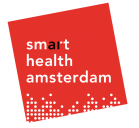
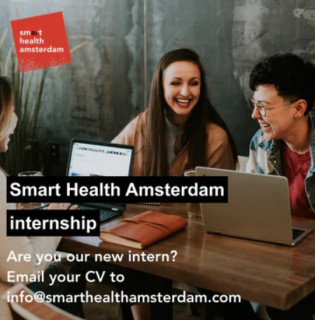
Looking for an internship where you can develop new skills in communications, marketing, PR and event management? Do you have an interest in how AI & data science can contribute to a healthier society and better medical care? Want to work as part of a fun and inspiring team?
As Amsterdam’s key network for data- and AI-driven innovation Smart Health Amsterdam (Gemeente Amsterdam & Amsterdam Economic Board) in #the #life #sciences and #health sector, we’re looking for an intern. Interested? Get in touch today.
https://smarthealthamsterdam.com/p/jobs-at--smart--health--amsterdam Smart
Sixty Minutes Back to the Future: Imagination and Urban Technology, Shaping the Smart City

Technology is everywhere: glued to other hands, integrated into our cars, or hidden behind garbage bins in your street. These technologies change the way we are in the world and experience it. For example, an urban walk is very different if you are efficiently using Google Maps to go from A to B, than if you are quietly strolling in the sunset. When was the last time that you got lost in the city or established a random conversation with a stranger while asking for directions? The introduction of technology in our cities disrupts how our society operates, calling for reflection and debate about the values that we hold important.
Building on insights from post-phenomenology, we reflect on the intricate nature of human-technology relations in the city, broadening it to a society-technology relation. Then, we reflect on how to turn these insights into practice. What do we need to not only reflect on and analyze past or current practices, but to foster our imagination and collective sense-making to take action towards inclusive and responsible practices? What role can design and futuring play in this?
In this lecture, Anouk Geenen and Julieta Matos-Castaño will employ an interdisciplinary approach to reflect on different theories and scholars that help us to create more responsible practices in our technological cities. Moving from Philosophy of Technology to Design Research, and bridging insights on issues and imagination, we follow a broad path of thinkers that broaden our horizon.
Nieuw platform voor innovatieve ondernemers 👨💻 zoekt feedback. 👇

Ben jij een ondernemer en is het voor jou ook lastig om tot samenwerking met gemeentes te komen? Vind je de (inkoop)procedures ook complex? Denk je ook dat Tenderned makkelijker en duidelijker zou kunnen zijn? En heb je hier ideeën over? Dan zoekt de Gemeente Amsterdam jou! Met jouw hulp kunnen wij aan de slag om dit te veranderen.
Waarom dit platform?
De Gemeente Amsterdam werkt, samen met partners uit de regio, aan een platform voor innovatieve ondernemers met nieuwe business opportunities bij overheden. Voor de grote uitdagingen van de stad (bv mobiliteit, klimaatneutraal) zijn innovatieve oplossingen hard nodig. De gemeente kan dit niet alleen en zoekt partijen met goede ideeën en producten.
We horen vaak van kleinere ondernemingen dat het, door complexe procedures en ingewikkelde platforms, niet makkelijk is om tot een samenwerking met de gemeente te komen. Het nieuwe platform, https://www.innovatiepartners.nl, heeft als doel om het voor beide kanten makkelijker, eenvoudiger en duidelijker te maken.
Beta zoekt feedback
Onlangs is de beta versie gelanceerd. Voor nu nog even met 1 project maar er komen binnenkort nieuwe projecten bij. Het komende jaar gaan we verder en jouw feedback helpt ons!
Wat vind jij goed aan het platform? Waar zie jij ruimte voor verbetering? Heb je nog andere goede ideeën wat we met dit platform zouden kunnen bereiken? We horen graag van je! Je kunt je reactie achterlaten in dit feedback formulier.
🙏🙏🙏
(PS: dit keer wel met een link die werkt 😄)
De staat van het internet 2021: Inclusieve AI
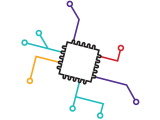
Elk jaar steken we de peilstok in het internet. Dit jaar onderzoeken we algoritmisch onrecht en andere potentiële gevaren van slimme en zelflerende systemen. Wie zitten er aan de knoppen? Wie ontwerpt de knoppen? En hoe zorgen we dat de veelgebruikte systemen voor iedereen even goed werken?
Hoofdspreker van De staat van het internet 2021 is Sennay Ghebreab, neuro-informaticus en professor aan de Universiteit van Amsterdam. 'Discriminerende algoritmes versterken de groeiende ongelijkheid in de samenleving,' waarschuwde hij eerder in een interview met OneWorld.
'Discriminerende algoritmes versterken de groeiende ongelijkheid in de samenleving.'
Het evenement vindt online plaats op vrijdag 29 januari om 16:00, is Nederlandstalig en gratis toegankelijk.
AI is niet neutraal
We weten het al langer: technologie is niet neutraal. Het is een vertaling van cultuur, wereldbeeld en politieke overtuiging. Vooroordelen, ongelijkheden en racisme zitten in technologie ingebakken. Het is de vraag welke ethische waarden als uitgangspunt worden gebruikt in de ontwerpen. Op verschillende niveaus kunnen er aannames in de systemen verwerkt worden, die daarna veelal niet goed traceerbaar zijn. Dus ook fouten, of bevooroordeelde aannames worden zo op grote schaal herhaald en bevestigd.
Het is vaak ondoorzichtig wat er precies ‘onder de motorkap’ van zelflerende technologie gebeurt, laat staan wie er verantwoordelijkheid draagt. Daarom is het evidenter en urgenter dan ooit om kritische vragen te blijven stellen bij het ontwikkelen en beoordelen van zelflerende technologie.
Tijdens deze editie van De staat van het internet gaan we in gesprek met een aantal experts over (on)verantwoorde algoritmes. Wat zijn de gevolgen voor de mensen waartegen AI bevooroordeeld (biased) is, wat is een wenselijk toekomstperspectief, en welke acties zijn er nodig?
Het programma bestaat uit een keynote van Sennay Ghebreab en een discussie met panelleden uit de politiek, wetenschappelijk onderzoek en wetgeving.
In aanloop naar de Staat van het Internet 2021 kun je nu alvast de documentaire Coded Bias bekijken.
Over De staat van het internet
Op 15 januari 2019 trapten we af met de eerste editie van De Staat van het Internet. Sindsdien staan we jaarlijks stil bij het moment waarop voor Amsterdam het internet als publiek domein toegankelijk werd. Op 15 januari 2021 is het inmiddels 27 jaar geleden dat de Digitale Stad haar deuren opende en het internet publiek toegankelijk werd. Tijdens de eerste editie in 2019 verzorgde hoogleraar media en digitale samenleving (Universiteit Utrecht) José van Dijck de lezing, waarin ze inzoomde op de rol van platforms in onze publieke ruimte. Vorig jaar ging Jaap-Henk Hoepman, expert op het gebied van privacy by design, in op onze digitale identiteit.
Kijk hier de lezingen terug van 2019 en 2020.
De Staat van het internet wordt mede mogelijk gemaakt door SIDN en de Universiteit van Amsterdam. Via het SIDN fonds steunt SIDN veel projecten die AI op een verantwoorde manier inzetten. Zie hier een overzicht.
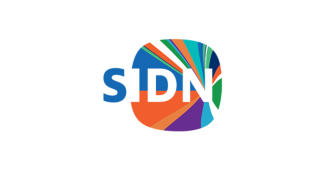
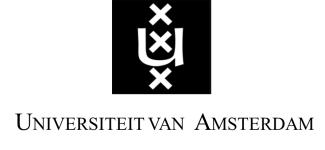
Metropolitan Mobility Podcast: De stad slimmer en schoner van goederen voorzien?
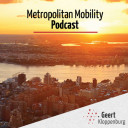
In deze podcast gaat Geert Kloppenburg in gesprek met Walther Ploos van Amstel en Carin ten Hage over digitale voorwaarden voor gezonde stadslogistiek. Luister hier de podcast: http://bit.ly/38ASVZ
Latest developments in the Amsterdam Smart City program
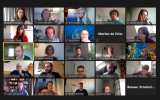
Last December, the 20 partners of Amsterdam Smart City came together to present the progress of innovation projects, ask for input, share dilemmas and involve other partners in their initiatives.
Following the thought that nobody wants to live in a smart city but in a nice, friendly, cosy city we work on challenges in which people play a central role. These gatherings are called Demo days and occur every 8-10 weeks. Get a quick overview of the topics and projects about to happen in the Amsterdam Metropolitan Area and let us know if you want to be involved!
ELSA Lab: AI, Media & Democracy
Pascal Wiggers, senior lecturer Responsible Artificial Intelligence at Amsterdam University of Applied Sciences, is working on an Ethical Legal Societal Aspects Lab to investigate and shape the impact of AI on our society. The University of Applied Sciences is doing this in co-creation together with residents, companies, knowledge institutions and governments. Partners want to understand how AI-driven applications in the media and public space
influence democracy. They also want to experiment with new applications of AI in the media and in the democratic process and draft new ethical and legal guidelines. Pascal is looking for parties that want to join the consortium. Various Amsterdam Smart City partners are interested to join. You too?
Object Detection Kit
Keeping the city streets clean is a major challenge. Maarten Sukel from the City of Amsterdam developed an image recognition system that shows streets in real time maps. For example, garbage bags and other unwanted objects in
the street scene are recognized. The system is based on machine learning and ultimately, we can clean Amsterdam more efficiently and sustainably. The system is continuously improved and tested. In the future it might be used for the recognition of water puddles in the streets, track missing pets, link with a module that shows the value of objects on the streets and more.
Seenons
Seenons believes in a future with 0% residual waste as a standard. Seenons makes it easy to separate waste and then pick it up separately and sustainably. Citizens and companies offer their separate flows via an app, the Seenons platform proposes the optimal route with the best transport options and delivers the residual flows to processors who make new products of them. Seenons also prevents contamination of flows through clear separation and fine-meshed collection. Environmental friendly transport is used, such as cargo bikes.
Mapping of material flows
Maintaining the value of the raw materials was a central topic at this Demoday. Martijn Kamps from Metabolic started with a presentation about recycling of materials. Based on cases in Rotterdam and Philadelphia he showed that there is a lot of construction and demolition waste that is still dumped or burned. This is issue is still not solved because there is too little data available about these materials. According to Metabolic, urban mining can help. A lot information about volumes of waste is available, but there is no business case yet. You can see where flows come from, identify them, decide where you store materials in the meantime and then, where you want to reuse them. The PUMA project was one of the first projects in this field and current projects are all a sequel to PUMA.
Arnout Sabbe from Geofluxus continued. Geofluxus is a startup which originates from REPAIR, a project with Metabolic and AMS Institute, among others. Geofluxus is working on a reclassification model for raw materials. Currently, there are many databases in which raw materials are registered. Geofluxus brings these together as a combination of data sources from industrial waste. In the Geofluxus monitor you can see how p.e. wood from the Amsterdam Metropolitan Area eventually spreads all over the world. It shows the impact on the road network and CO2 emissions for certain waste streams elsewhere. Geofluxus is developing this monitor for the City of Amsterdam and expects to have it ready by the end of next year, although the municipality is dependent on the availability of data. New partnerships are therefore necessary. But a first success is already visible: through the monitor is clear that 70% of the waste in the Amsterdam Metropolitan Area is caused is used by only 7% of companies. A result worth continuing this work and something to hold on to!
Collaboration between governments and innovative companies
In order to innovate we have to work together; governments and innovative companies. That is not always easy. Various organizational cultures and interests collide. Everyone is in their own system and has its own pace. We had an open and honest discussion on this based on two cases. One of the companies started with some positive feedback: the region is at the forefront of circularity, there is a lot of attention and ambition. But collaborating is different. The company experiences a lot of reluctance, especially from governments. There is little willingness to take
responsibility and work outside existing frameworks. In addition, there is an enormous fragmentation of tasks and a fear of explicitly saying yes or no. For the other company this story is recognizable. They experience a lot of enthusiasm about their company, but still it takes a huge amount of time to involve different departments and decision making is very slow. They noted it is time to get out of the pilot sphere and important to mention business models early on.
There was a lot of understanding and recognition from the government side. They recognized the stories about the silos and indicated that it takes a lot of people and time to make decisions. Governments are less likely to think outside the box and both parties must invest in building trust. The advice that came out for both parties: embrace complexity, be persistent, be open to each other, be clear about expectations, go where the energy flows. And as a positive conclusion: once collaboration is there, governments are nice, loyal and reliable partners.
CleanMobileEnergy (CME)
Cenex The Netherlands is in the middle of the development of an intelligent Energy Management System (iEMS), based on three urban pilots in Nottingham (UK), Arnhem (NL) and Schwabisch Gmund (DE). The goal is to develop a transnational and generic iEMS. In these cities, the pilot elements are currently being put out to tender and connected to the iEMS. Cenex would like to know which mobility and energy initiatives could be suitable for integrating in this iEMS.
Sharing Energy in Almere Haven
The City of Almere joined Amsterdam Smart City as a partner and has many great initiatives to share with the network. In 2020 Almere started EARN-E to reduce the use of electricity and gas in people's homes. Next year, Wijkie will be launched: this combines the energy transition with social needs in a neighbourhood. The core is the sharing of energy with your neighbours in your neighbourhood. In order to set up Wijkie successfully, it is important to enter into dialogue with residents.
The Energy Transition Explained
The energy transition is "hot". Much has been reported in the media, but the reporting is not always easy to understand and sometimes even confusing. Knowledge is needed to critically follow the news about the energy transition. That is why Sanne de Boer wrote the book ‘De energietransitie uitgelegd’. The book provides all the basic knowledge needed to follow news and form informed opinions in discussions. Sanne is looking for suggestions for where to market her book to be able to transfer this knowledge.
Curtailment for solar panels
As an energy platform, Vandebron is an innovative player in the field of sustainable energy. They took us along in the story of solar panel curtailment: remotely on and off switching of energy. A well-known phenomenon in the energy world is that the electricity demand is reasonably stable, but due to the volatility of renewable energy there are significant peaks in the electricity supply every year. The result is that the energy grid becomes full due to the surplus of electricity. This creates problems for the grid operator, who is then forced to hand out a fine. In this case, this means a possible fine for Vandebron, who then has to pass it on again to the producer. Nobody is happy about that.
Curtailment could be a solution. Curtailment makes sure that a surplus can be avoided, when solar panels are switched off in time. The central question is: "How to do this effectively?" It is clear that some degree of curtailment is inevitable, but it is also important to determine whether the energy surplus can be reduced in another way. There is still a world to be won with out-of-the-box thinkers on board.
Energy from braking power
The engine of a train or tram is comparable to the dynamo of a bicycle. In addition to powering the train, the motor is also able to generate energy. This happens, for example, during braking. How can we return the energy that is generated to the grid? And what are the options to apply this in neighbourhood hubs? Arcadis told us that energy generated with the brake of a train, can provide an average household with energy for 2.5 weeks.
This offers a lot of opportunities. Braking energy can be deployed immediately in your own system, it can be stored and then deployed, it can be made available to other parties via neighbourhood hubs. And there is more. Suggestions at that popped up at the demoday: returning energy to grid operators, making a link with buses, ferries and taxis, supplying shops at the station, neighbourhood batteries. To get a step further, possible obstacles have to be overcome as well of course. Experts will work on technological challenges and the saving of a lot of energy in a short time among others. In January, Arcadis, the City of Amsterdam, AMS Institute and Alliander will continue working on this topic. Interested? Then contact us.
Future Fitness Garden
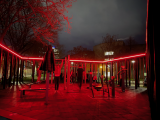
Getting fit and healthy again in 2021? Since the citywide lockdown, members of local sport-clubs have been forced outdoors. One of the most popular (outdoor) fitness areas on the Amsterdam waterfront has been the Marineterrein. In our latest project “Future Fitness Garden” we explore how smart lighting can remind us of safe distancing and capacity in public space during Corona.
Using algorithms we can anonymously detect proximity and density of people working out. For example if they come within 1,5 meters to one another the LED strips turn BLUE. If there are too many people occupying the area the LED will turn RED. This system gently reminds guests to respect each other’s space while sharing the future fitness garden.
Thanks to project partners Marineterrein Amsterdam. Compliments to AI genius Markus Pfundstein, Electrical Mechanical Wizard Werner Pfundstein
Knowledge Quest: Submit Your Example of a Great High Density Environment

Do you know a great example of high density living environments built within the last 30 years? Share your knowledge and contribute to the creation of an open repository via Crowd Creation. To be truly exemplary, the area should include a mixture of functions (at least some of them high-rise) where the physical fabric retains a human scale at street level despite the high density.
You may wonder who's asking for and compiling this information: the Chair of Spatial Urban Transformation at the Amsterdam University of Applied Sciences is committed to building an open-access repository. Sharing best practices across the globe is becoming increasingly vital, especially as many of our western cities are on the eve of unprecedented densification. As a humble thank you for helping to guide this societal challenge, they've allotted 12 rewards for contributors. Click here to submit a project.
Societal Context
Like many of our Western cities, Amsterdam is on the brink of intensive urban densification. The metropolitan area of Amsterdam plans to add 100,000 new dwellings, mostly within the existing urban fabric. Compact studio apartments and new situational typologies of high-rises are part of the program, which will increase the densification even further. How are we to retain a human scale in these new high-density environments, especially at the street level where our social fabric is shaped? This calls for a new array of examples and precedent studies of successful existing "Great High Density Environments." What are their design properties and how are they programmed? How do they succeed in retaining a human scale?
 Amsterdam - Image Courtesy of Amsterdam University of Applied Sciences
Amsterdam - Image Courtesy of Amsterdam University of Applied Sciences
Sensing Streetscapes Project
These questions are central to the Sensing Streetscapes Project initiated by the Chair of Spatial Urban Transformation at the Amsterdam University of Applied Sciences (AUAS). In a consortium of spatial design offices and clients of large scale projects, action research is explored along three lines. First, building on the classic works of Allan Jacobs, Jan Gehl and the like, six of the most-used reference locations for these new environments are deconstructed by research through design. Second, neuro-architectural technologies (eye-trackers) are deployed to uncover the visual impact of the applied design principles: What are the patterns? Do these design solutions indeed mitigate the high density and intensity to a human scale on the level of the streetscape? Finally, an algorithm is developed to trace the most suitable best practices via AI. That’s where you come in.
 Cassilis Road, London - Image Courtesy of Amsterdam University of Applied Sciences
Cassilis Road, London - Image Courtesy of Amsterdam University of Applied Sciences
Repository of Great Examples by Crowd Creation
Some high profile examples of great high density environments are well known, like in Vancouver, Toronto, London, Manchester, Amsterdam, Hamburg, and Manhattan. Yet what lesser-known examples of Great High Density Living Environments are out there for us to learn from? Share your knowledge and contribute to the creation of an open repository via Crowd Creation.
In order to frame the search, a list of desired characteristics:
- Residential environment in an inner city area
- Built within the last 30 years – or about to be 'opened' soon
- Built for High Density with some high-rise buildings
- Success in creating a human scale at eye-level on the street
- Some level of mixed functions, green design, etc. - anything that increases the livability of the environment
Click here to submit a project.
 Hardman Street, Manchester - Image Courtesy of Amsterdam University of Applied Sciences
Hardman Street, Manchester - Image Courtesy of Amsterdam University of Applied Sciences
You are, of course, allowed to offer one of your own projects as an example. The deadline for submissions is January 29th, 2021 and as a modest gesture of thanks for helping address this societal challenge, 12 rewards are available to contributors. Out of the projects that fit the characteristics, consortium members will select the contributors who delivered either multiple great examples, surprisingly interesting examples, or in-depth descriptions and pictures. 12 entrants will be randomly selected to be rewarded:
- 2 will receive personalized book selections on this topic (favorites of the Chair)
- 6 will receive an Amazon gift card with a value of €50
- 4 will receive a ticket to the Media Architecture Biennale 2021
- Winners will be notified personally
Visit the results at https://sensingstreetscapes.com. The website will remain open afterwards, so feel free to keep sending your examples!
Launch Responsible Sensing Lab & Opening of Exhibit 'Senses of Amsterdam'

On January 28, we will officially launch the Responsible Sensing Lab during an interactive online event. This event also marks the opening of ‘Senses of Amsterdam’ at NEMO Studio: an exhibit about the sensors in the city.
To celebrate this, we would like to invite you to join the interactive Livestream of this event. In several online workshops we will talk about what responsible sensing means, and discuss what should be done to design a better, more democratic, and more responsible digital future city.
Our keynote speaker Anthony Townsend will discuss the current state of Smart Cities through a Livestream from the US. Deputy Mayor Touria Meliani will close the program with the official (virtual) opening of the exhibit.
Anthony Townsend is a writer and researcher whose work lies at the intersection of urbanization and digital technology. Anthony will give a keynote called From Parasite to Symbiant: Redesigning Our Relationship With Urban Sensors.
Deputy Mayor Touria Meliani is responsible for Arts and Culture, and Digital City, for the City of Amsterdam. Meliani will officially open the Exhibition 'Senses of Amsterdam' on display at the NEMO de Studio.
Program
14:50 Virtual walk-in workshop groups
15:00 WORKSHOPS
A. Designing Citizen Interactions for Urban Sensing Systems
| Kars Alfrink | TU Delft, Researcher, Designer and PhD candidate Industrial Design
| Marcel Schouwenaar | The Incredible Machine, Designer and Creative director
B. Designing Checks and Balances for Urban Surveillance
| Aafke Fraaije | VU Amsterdam, Researcher and PhD Candidate
| Surbhi Agrawal | AMS Institute & RSL, Urbanist and Research Assistant
C. Sensor data
| Anne-Maartje Douqué | City of Amsterdam, CIO Office, Advisor Personal Data
| Beryl Dreijer | City of Amsterdam, CTO Office, Privacy Officer
D. Responsible Crowd Sensing Toolkit
| Tom van Arman | CITIXL, Urban Innovator
| Paul Manwaring | CITIXL, Urban Innovator
15:50 Closing workshops
16:00 LIVESTREAM EVENT FROM NEMO STUDIO
| Moderator | Derisee Hoving
16.10 KEYNOTE
From Parasite to Symbiant: Redesigning Our Relationship With Urban Sensors
| Anthony M. Townsend | Writer and Researcher
16:30 TALKSHOW
Responsible Sensing Lab
| Thijs Turel | AMS Institute, Program Manager Responsible Digitization
| Coen Bergman | City of Amsterdam, CTO, Innovation Developer Public Tech
16:55 PANEL DISCUSSION
Influence of Corona on surveillance in Amsterdam
| Beryl Dreijer | City of Amsterdam, CTO Office, Privacy Officer
| Judith Veenkamp | Waag, Head of Smart Citizens Lab
| Prof dr. Gerd Kortuem | TU Delft & AMS Institute, Professor of Internet of Things
17:15 INTERVIEW
Responsible Sensing Lab & Smart Cities
| Deputy Mayor Meliani | Responsible for Arts and Culture, and Digital City
17:25 EXHIBIT OPENING
'Senses of Amsterdam' with a virtual tour
| Deputy Mayor Meliani | Responsible for Arts and Culture, and Digital City
17:30 Closing
Register here
It is both possible to join the program at 15.00h for the workshops, or at 16.00h for the rest of the program. Please let us know which part(s) of the program you will be joining by clicking here.
More information on the workshops can be found in the registration link.
You will receive a link to the Livestream a day in advance.
Senses of Amsterdam
In 'Sense of Amsterdam' you can discover how sensors make Amsterdam a Smarter city. This interactive installation at NEMO Studio is about the sensors we use in our city. What measurements are taken and how is data collected? The installation informs about the sensors in Amsterdam and how these sensors make the city smarter. You will be challenged to think along with them, and how we can make their use more 'responsible'.
The installation is a collaboration of AMS Institute, City of Amsterdam and NEMO, and is part of the program Responsible Sensing Lab.
Responsible Sensing Lab
This lab explores how to integrate social values in the design of sensing systems in public space. It is a testbed for conducting rigorous, transparent, and replicable research on how smart technologies placed in public space can be designed in a way that makes the digital city ‘responsible’. The Responsible Sensing Lab (RSL) is a collaboration of AMS Institute and the Digital City program of the City of Amsterdam. More information here.
Stay up to date
Get notified about new updates, opportunities or events that match your interests.

